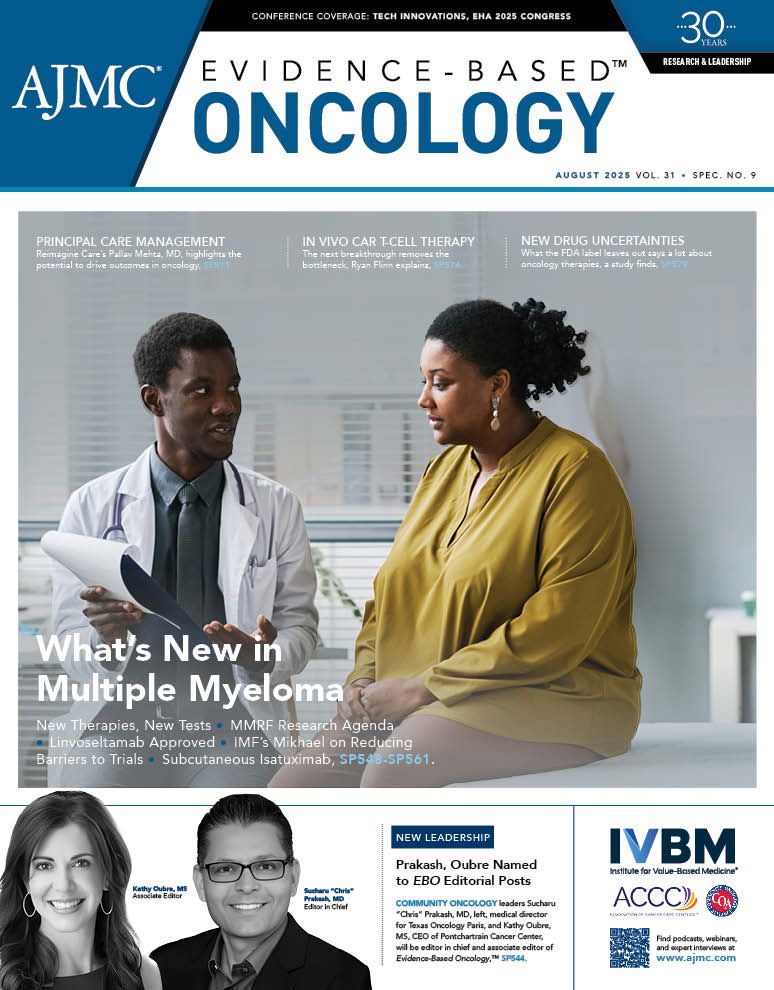- Center on Health Equity & Access
- Clinical
- Health Care Cost
- Health Care Delivery
- Insurance
- Policy
- Technology
- Value-Based Care
FDA Approves Linvoseltamab to Treat R/R Multiple Myeloma
This approval comes almost a year after the drug received a complete response letter due to third-party manufacturing issues.
Linvoseltamab (Regeneron) has been approved by the FDA to treat adults with relapsed/refractory (R/R) multiple myeloma (MM) who have undergone at least 4 prior lines of therapy, including a proteasome inhibitor, an immunomodulatory agent, and an anti-CD38 monoclonal antibody.1
The approval marks a critical step forward for patients with late-stage MM, many of whom face limited treatment options and progressive disease.
"Lynozyfic demonstrated early, deep and durable responses in heavily pre-treated patients, which I saw firsthand in clinical trials,” Sundar Jagannath, MD, trial investigator and network director of the Center of Excellence for Multiple Myeloma at Mount Sinai, said in a news release. “Lynozyfic has a convenient response-adapted dosing regimen, which provides the potential to extend time between doses. This is a significant patient-centric advancement that could help reduce treatment burden.”
Sundar Jagganath, MD, PhD | Image: IMF

Patients Reach 70% ORR With Linvoseltamab
Linvoseltamab is a bispecific antibody designed to activate T cells by binding to B-cell maturation antigen (BCMA) on MM cells and CD3 on T cells, enabling immune-mediated tumor destruction. According to an FDA news release, the approval was based on results from the ongoing phase 1/2 LINKER-MM1 trial (NCT03761108), which demonstrated robust and durable responses in a heavily pretreated population.2 Patients receiving linvoseltamab experienced a 70% objective response rate (ORR), with 45% achieving a complete response (CR) or better and a 0.95-month median time to first response, ranging from half a month to 6 months.1
Previous reports showed that, at a median follow-up of 14.3 months, the ORR at the approved 200-mg dose was 71%, with half of patients achieving a CR or better and a 29-month median duration of response.3 Nearly 45% achieved a stringent CR, and the depth of response allowed some patients to transition to less frequent dosing under a response-adapted regimen.
Mansi Shah, MD, assistant professor at Rutgers Cancer Institute of New Jersey, presented data at the American Society of Hematology Annual Meeting & Exposition 2024 showing linvoseltamab’s continued high efficacy in patients with R/R MM, including high-risk subgroups.4 At a median follow-up of 21.3 months, the results stayed the same: the ORR was 71%, with 52% of patients achieving a CR or better—a 2% increase—and a median duration of response of approximately 29 months.
Despite the high response rates, safety remains a consideration in clinical use. Cytokine release syndrome (CRS) occurred in 46% of patients in the LINKER-MM1 trial. However, most cases were mild and resolved quickly within a median of 14.7 hours, supporting a favorable safety profile compared with other bispecific antibodies, according to Shah. She also said reduced dosing frequency after initial treatment led to a notable decline in infection rates over time.
Linvoseltamab is administered weekly at its full dose following an initial step-up schedule, with dosing reduced to every 2 weeks after week 16; for patients who achieve a very good partial response or better after 24 weeks, dosing is reduced to every 4 weeks.1
Already Approved in Europe
Fill/finish manufacturing deficiencies at a third-party facility had previously resulted in a complete response letter (CRL).5 Importantly, there were no safety or efficacy concerns cited in the initial CRL, but the manufacturing issues were not addressed in the approval.
Europe was a step ahead of the US, with the European Medicines Agency having already approved linvoseltamab for the same indication.6 Overseas, the bispecific antibody is approved for patients with 3 or more prior therapies—including a proteasome inhibitor, an immunomodulatory agent, and an anti-CD38 monoclonal antibody—who demonstrated disease progression on the last therapy.
References
- Lynozyfic (linvoseltamab-gcpt) receives FDA accelerated approval for treatment of relapsed or refractory multiple myeloma. Regeneron. News release. July 2, 2025. Accessed July 2, 2025. https://investor.regeneron.com/news-releases/news-release-details/lynozyfictm-linvoseltamab-gcpt-receives-fda-accelerated-approval
- Phase 1/2 study of REGN5458 in adult patients with relapsed or refractory multiple myeloma (LINKER-MM1). Clinicaltrials.gov. Updated May 15, 2025. Accessed June 20, 2025. https://clinicaltrials.gov/study/NCT03761108
- Rosa K. Linvoseltamab elicits deep, durable responses in R/R multiple myeloma. OncLive®. June 17, 2024. Accessed June 20, 2025. https://www.onclive.com/view/linvoseltamab-elicits-deep-durable-responses-in-r-r-multiple-myeloma
- Steinzor P. Linvoseltamab shows durable efficacy, manageable safety in R/R multiple myeloma. AJMC®. December 10, 2024. Accessed June 20, 2025. https://www.ajmc.com/view/linvoseltamab-shows-durable-efficacy-manageable-safety-in-r-r-multiple-myeloma
- Klein HE. FDA issues CRL for linvoseltamab in R/R multiple myeloma. AJMC. August 21, 2024. Accessed June 20, 2025. https://www.ajmc.com/view/fda-issues-crl-for-linvoseltamab-in-r-r-multiple-myeloma
- Lynozyfic (linvoseltamab) approved in the European Union for the treatment of relapsed/refractory multiple myeloma. Regeneron. News release. April 28, 2025. Accessed June 20, 2025. https://investor.regeneron.com/news-releases/news-release-details/lynozyfictm-linvoseltamab-approved-european-union-treatment

